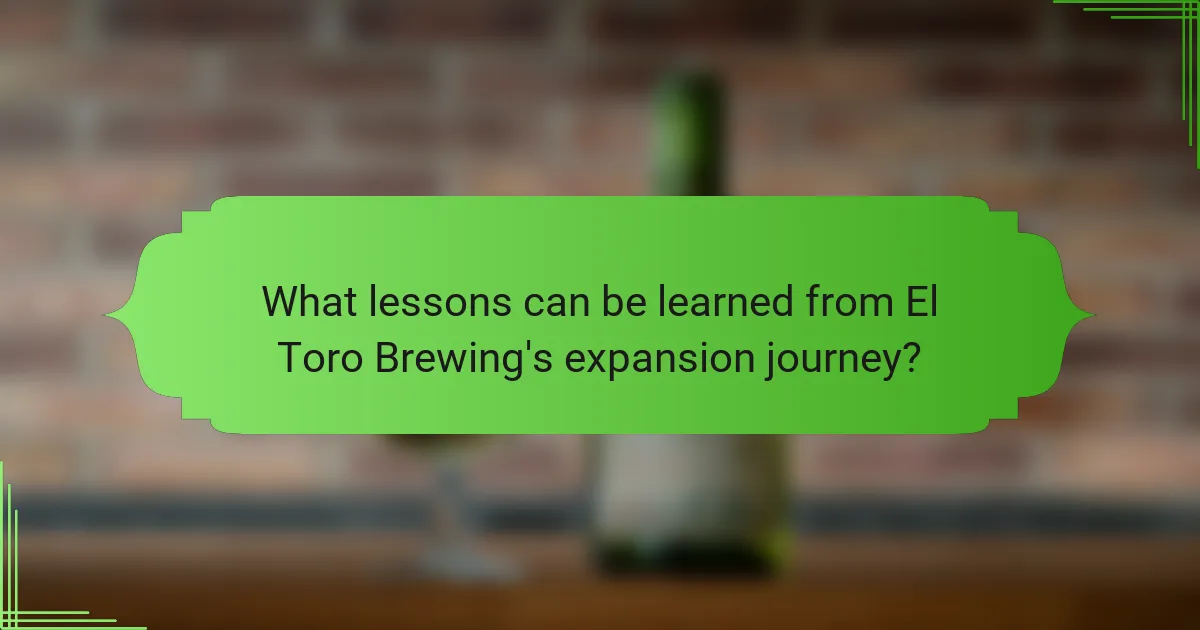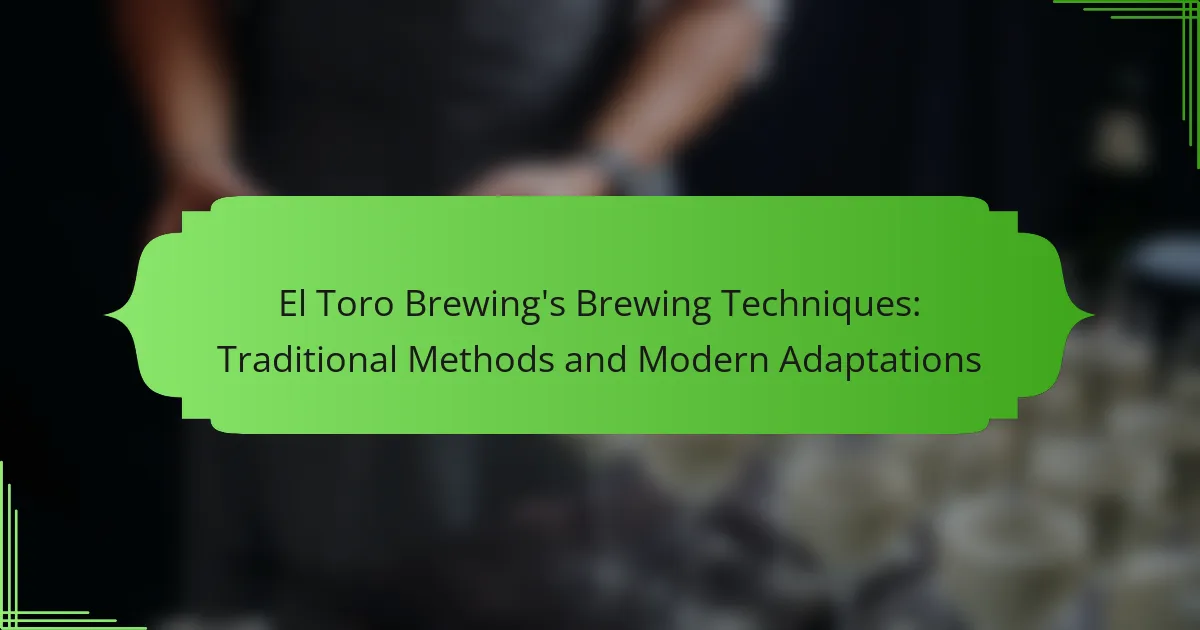El Toro Brewing is a North Carolina-based brewery that has transitioned from local operations to achieving national recognition since its founding in 2015. The brewery initially specialized in unique craft beers, expanding its production capacity and distribution beyond North Carolina by 2020. Despite facing challenges such as increased production demands, ingredient sourcing issues, and competition from established brands, El Toro Brewing has successfully built a loyal customer base through a commitment to quality and community engagement. The article outlines key lessons learned during their expansion journey, emphasizing the importance of market research, brand identity, strategic partnerships, and adaptability in business growth.

What is El Toro Brewing’s Expansion Journey?
El Toro Brewing’s expansion journey involves its growth from a local brewery to achieving national recognition. Founded in 2015, El Toro Brewing started in a small facility in North Carolina. The brewery initially focused on producing craft beers with unique flavors. As demand increased, El Toro expanded its production capacity in 2018. This included investing in new brewing equipment and hiring additional staff. By 2020, El Toro began distributing its beers beyond North Carolina. The brewery’s commitment to quality and innovation helped it gain a loyal customer base. Awards at national beer competitions further solidified its reputation. Today, El Toro Brewing continues to explore new markets and expand its product line.
How did El Toro Brewing start its journey?
El Toro Brewing began its journey as a small local brewery in 2011. It was founded by a group of passionate craft beer enthusiasts. They aimed to create unique and flavorful beers. The founders started brewing in a modest facility. Their commitment to quality quickly gained local attention. Community support helped them expand their offerings. Over time, El Toro Brewing developed a loyal customer base. This laid the groundwork for future growth and national recognition.
What were the initial challenges faced by El Toro Brewing?
El Toro Brewing faced several initial challenges during its establishment. One major challenge was securing funding to launch operations. The brewery required significant capital for equipment and facility renovations. Another challenge was navigating regulatory requirements for brewing and selling alcohol. Compliance with local and federal laws posed hurdles in the early stages. Additionally, establishing a brand identity in a competitive market was difficult. El Toro Brewing needed to differentiate itself to attract customers. These challenges were compounded by the need for effective distribution channels. Building relationships with retailers and distributors was essential for market [censured].
What motivated the founders to pursue expansion?
The founders of El Toro Brewing were motivated to pursue expansion to increase brand visibility and market share. They recognized the growing demand for craft beer across the nation. This demand presented a significant opportunity for growth. The founders aimed to reach a wider audience beyond their local market. They also sought to enhance their production capacity to meet increasing consumer interest. By expanding, they could leverage economies of scale. This would ultimately lead to improved profitability and sustainability. Their vision was to establish El Toro as a recognized name in the craft beer industry.
What key milestones marked El Toro Brewing’s growth?
El Toro Brewing’s growth was marked by several key milestones. The brewery was established in 2014 in North Carolina. It quickly gained local popularity through unique craft beers. In 2016, El Toro expanded its brewing capacity to meet rising demand. The brewery launched a successful distribution strategy in 2017. This allowed their products to reach neighboring states. In 2019, El Toro won multiple awards at national beer competitions. This recognition increased their brand visibility significantly. By 2021, El Toro Brewing had established a strong online presence and community engagement.
What significant events contributed to its local recognition?
El Toro Brewing gained local recognition through several significant events. The brewery launched its first craft beer in 2012, attracting local enthusiasts. In 2014, El Toro won a regional brewing competition, enhancing its reputation. Community events, such as beer tastings and festivals, increased local engagement. The brewery also partnered with local restaurants for exclusive beer offerings. These collaborations helped solidify its presence in the community. Additionally, El Toro’s commitment to sustainability resonated with local consumers. The brewery’s active participation in charity events further boosted its local image. Collectively, these events established El Toro Brewing as a beloved local brand.
How did El Toro Brewing achieve national recognition?
El Toro Brewing achieved national recognition through innovative brewing techniques and unique flavor profiles. Their commitment to quality and creativity set them apart in a competitive market. They gained attention by winning multiple prestigious awards at national beer competitions. Their flagship beers received critical acclaim, enhancing their reputation. Strategic marketing efforts also played a significant role in their visibility. Collaborations with local businesses and participation in craft beer festivals increased their exposure. Additionally, positive reviews from influential beer critics contributed to their growing popularity. Overall, El Toro Brewing’s dedication to excellence and community engagement solidified their national presence.
What strategies did El Toro Brewing employ for expansion?
El Toro Brewing employed several strategies for expansion. They focused on increasing production capacity to meet growing demand. The brewery invested in advanced brewing technology to enhance efficiency. They also expanded their distribution network to reach new markets. Collaborations with local restaurants and bars helped promote their products. Participation in craft beer festivals increased brand visibility. They utilized social media marketing to engage with customers effectively. These strategies collectively contributed to their national recognition in the brewing industry.
How did marketing play a role in the expansion process?
Marketing was crucial in El Toro Brewing’s expansion process. It helped establish brand identity and awareness. Targeted advertising campaigns increased visibility in local and national markets. Social media engagement built a loyal customer base. Collaborations with local events promoted community involvement. Strategic partnerships with distributors expanded product reach. These efforts contributed to significant sales growth. Ultimately, effective marketing drove El Toro Brewing’s transition from a local brewery to a nationally recognized brand.
What partnerships were crucial for El Toro Brewing’s growth?
El Toro Brewing’s growth was significantly influenced by partnerships with local farmers and distributors. Collaborating with local farmers ensured a steady supply of fresh ingredients. This commitment to local sourcing enhanced the quality of their brews. Additionally, partnerships with regional distributors expanded their market reach. These distributors facilitated entry into new retail and restaurant venues. Such collaborations helped El Toro Brewing establish a strong presence in the craft beer market. This strategic approach contributed to their recognition beyond local boundaries.

What challenges did El Toro Brewing face during its expansion?
El Toro Brewing faced several challenges during its expansion. Increased production demands strained their existing facilities. They encountered difficulties in sourcing quality ingredients consistently. Distribution logistics became complex as they entered new markets. Regulatory compliance issues arose in different states. Additionally, they faced competition from established national brands. Financial constraints limited their marketing efforts. These factors collectively hindered their growth trajectory.
How did market competition impact El Toro Brewing?
Market competition significantly influenced El Toro Brewing’s growth and strategic decisions. The brewery faced pressure from both local and national craft beer brands. This competition prompted El Toro Brewing to innovate its product offerings. They developed unique beer flavors to differentiate themselves. Additionally, market competition forced El Toro to enhance its marketing strategies. They focused on building a strong local brand presence. This included community engagement and participating in local events. Ultimately, competition drove El Toro Brewing to expand its distribution channels. They sought partnerships with local restaurants and retailers to increase visibility.
What strategies did El Toro Brewing use to differentiate itself?
El Toro Brewing differentiated itself through unique brewing techniques and a focus on local ingredients. The brewery emphasized craft quality and innovative flavors. They created distinct seasonal brews that appealed to local tastes. El Toro also engaged the community through events and partnerships. Their branding highlighted a commitment to sustainability and environmental responsibility. This approach resonated with consumers seeking authentic experiences. The brewery’s strong social media presence helped build a loyal customer base. El Toro’s dedication to quality and community involvement set it apart in the competitive craft beer market.
How did El Toro Brewing adapt to changing consumer preferences?
El Toro Brewing adapted to changing consumer preferences by diversifying its product offerings. The brewery introduced a range of craft beers that cater to various tastes. They incorporated popular styles such as IPAs, stouts, and sours. El Toro also focused on quality ingredients to meet the demand for premium products. Additionally, they embraced seasonal and limited-edition brews to attract adventurous consumers. The brewery engaged with its community through events and tastings to gather feedback. This strategy allowed them to stay aligned with market trends and consumer interests. Through these efforts, El Toro Brewing successfully enhanced its brand appeal and customer loyalty.
What operational challenges did El Toro Brewing encounter?
El Toro Brewing encountered several operational challenges during its expansion. One major challenge was scaling production to meet increased demand. As the brewery grew, maintaining quality control became more difficult. Additionally, supply chain issues arose, affecting the availability of key ingredients. Labor shortages also posed a significant challenge, impacting production timelines. The brewery faced regulatory hurdles that complicated distribution. Finally, competition in the craft beer market intensified, requiring strategic marketing efforts. These challenges collectively tested El Toro Brewing’s operational capabilities during its growth phase.
How did supply chain issues affect the expansion process?
Supply chain issues significantly delayed El Toro Brewing’s expansion process. Disruptions in raw material availability hindered production schedules. This led to increased costs and operational inefficiencies. Additionally, transportation delays affected distribution timelines. As a result, planned openings in new markets were postponed. These challenges ultimately impacted revenue growth and brand visibility. The brewery had to reassess its expansion strategy in light of these obstacles.
What role did staffing play in the growth of El Toro Brewing?
Staffing was crucial to the growth of El Toro Brewing. The brewery focused on hiring skilled brewers and knowledgeable staff. This ensured high-quality beer production. Experienced employees contributed to innovative brewing techniques. A strong team enhanced customer service and brand reputation. Staffing decisions directly impacted operational efficiency. As a result, El Toro Brewing expanded its market reach. Increased production capacity met growing consumer demand.

What lessons can be learned from El Toro Brewing’s expansion journey?
El Toro Brewing’s expansion journey teaches several key lessons for business growth. First, understanding local markets is crucial. El Toro Brewing conducted thorough market research before entering new regions. This helped them tailor their products to local tastes. Second, building a strong brand identity is essential. El Toro Brewing focused on quality and community engagement, which fostered customer loyalty. Third, strategic partnerships can accelerate growth. Collaborations with local distributors expanded their reach effectively. Lastly, adaptability is vital in a changing market. El Toro Brewing adjusted its strategies based on consumer feedback and industry trends. These lessons highlight the importance of research, branding, partnerships, and adaptability in successful business expansion.
What best practices emerged from El Toro Brewing’s experience?
El Toro Brewing’s experience highlighted several best practices in brewery expansion. First, maintaining quality consistency across all products is crucial. This ensures customer satisfaction and brand loyalty. Second, effective marketing strategies tailored to regional preferences proved beneficial. Engaging with local communities helped to build a strong customer base. Third, investing in staff training enhanced operational efficiency. Skilled employees contributed to better service and product quality. Lastly, leveraging social media for brand awareness increased visibility. This approach attracted a broader audience and facilitated customer interaction. These best practices collectively supported El Toro Brewing’s successful transition from a local brewery to national recognition.
How can other breweries apply El Toro Brewing’s strategies?
Other breweries can apply El Toro Brewing’s strategies by focusing on community engagement and quality product offerings. El Toro Brewing emphasizes local partnerships, which helps build a loyal customer base. They also prioritize innovative brewing techniques, ensuring unique flavors that attract diverse consumers. Additionally, effective marketing campaigns that highlight their brand story resonate well with customers. Utilizing social media to connect with patrons enhances brand visibility and customer interaction. Furthermore, El Toro Brewing invests in sustainability practices, appealing to environmentally conscious consumers. By adopting these strategies, other breweries can enhance their market presence and foster growth.
What common pitfalls should new breweries avoid based on El Toro Brewing’s journey?
New breweries should avoid overextending their resources, as El Toro Brewing faced challenges with scaling operations too quickly. They struggled with maintaining quality while increasing production. Financial mismanagement also led to cash flow issues during their expansion phase. Lack of market research resulted in misjudging consumer preferences, impacting sales. Additionally, El Toro Brewing encountered difficulties in building a strong brand identity amidst competition. They learned the importance of effective marketing strategies to connect with their audience. Lastly, neglecting staff training affected service quality, emphasizing the need for investing in team development.
What future opportunities lie ahead for El Toro Brewing?
El Toro Brewing has several future opportunities for growth. Expanding distribution channels can increase market reach. Collaborations with local restaurants may enhance brand visibility. Introducing new seasonal brews can attract diverse customer segments. Investing in sustainable brewing practices could appeal to environmentally conscious consumers. Participation in craft beer festivals can boost brand recognition. Leveraging social media for marketing can engage a broader audience. Exploring e-commerce options may provide direct-to-consumer sales opportunities. These strategies align with industry trends and consumer preferences, supporting El Toro Brewing’s growth potential.
How might El Toro Brewing continue to innovate in the market?
El Toro Brewing might continue to innovate in the market by diversifying its product line. Introducing seasonal and limited-edition brews can attract new customers. Collaborating with local farms for unique ingredients may enhance flavor profiles. Investing in sustainable brewing practices can appeal to environmentally conscious consumers. Utilizing technology for enhanced brewing efficiency can improve production quality. Engaging with the community through events and tastings fosters brand loyalty. Expanding distribution channels to online platforms can increase market reach. These strategies align with current industry trends and consumer preferences.
What trends could influence El Toro Brewing’s next steps?
Increasing consumer demand for craft beer influences El Toro Brewing’s next steps. The craft beer market has grown significantly, with a 5% increase in sales in the past year. Sustainability trends also impact decision-making. Consumers prefer breweries that practice eco-friendly methods. The rise of online sales channels is another trend. E-commerce in the beverage industry surged by 40% during the pandemic. Health-conscious choices are shaping product development. Low-alcohol and non-alcoholic options are gaining popularity among consumers. Lastly, local sourcing of ingredients is a growing trend. This approach can enhance brand loyalty and community support.
El Toro Brewing is the primary entity in this article, which details its expansion journey from a local brewery in North Carolina to achieving national recognition. Founded in 2015, El Toro Brewing faced initial challenges such as securing funding and navigating regulatory requirements, but successfully increased production capacity and expanded its distribution network by 2020. Key milestones include winning awards at national competitions and building a loyal customer base through innovative brewing techniques and community engagement. The article also explores the strategies employed for growth, operational challenges encountered, and lessons learned that can benefit other breweries.


